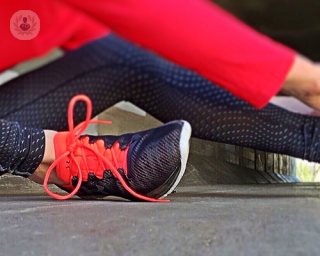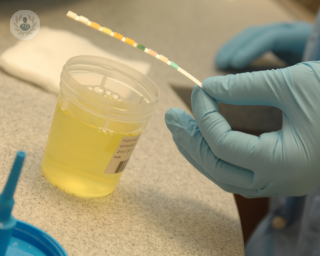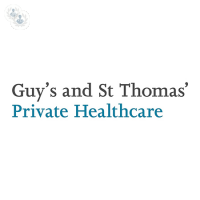What is a urinary tract infection?
Urinary tract infection (UTI) refers to inflammation in the urinary tract caused by bacteria, the most common type of infection in the urinary tract. An infection occurs when bacteria reaches the bladder (cystitis) or kidneys, multiplying in the urine. If left untreated, the infection may cause permanent damage to the bladder or kidneys.
You should see a urologist if you have signs/symptoms of a urinary tract infection.
Symptoms of urinary tract infections:
There are various symptoms of urinary tract infections, including:
- The feeling of needing to urinate more frequently than usual, but not passing much urine.
- Pain or burning sensation whilst urinating.
- Incontinence, bloody or foul-smelling urine.
- Mild fever, sweating or chills.
- Pain in the sides, abdomen or pelvic area.
- Fatigue
What are the causes of urinary tract infections?
There are many factors that increase the probability of a urinary tract infection. Some of these risk factors are:
- A new sexual partner or multiple partners.
- More frequent sexual intercourse.
- Diabetes, kidney stones or any problem that means the bladder does not completely empty.
- Being pregnant increases the risk of infection.
- Waiting too long to urinate.
- Not wiping correctly, for females, who should wipe from the front to the back.
Can urinary tract infections be prevented?
There is no sure way to prevent UTIs, but there are recommendations for reducing the risk of developing an infection:
- Drink 6 to 8 glasses of water every day.
- Eliminate refined items, sugar, alcohol and caffeine.
- Take vitamin C and zinc.
- Urinate before and after sexual intercourse.
- Do not wear tight-fitting trousers.
- Urinate when necessary and empty the bladder completely.
- Wipe correctly after urinating, as detailed above.
What is the treatment for urinary tract infections?
Antibiotics: Antibiotics are the primary treatment for UTIs. The choice of antibiotic and the duration of treatment depend on the type of UTI, its severity, and the patient's medical history.
Course of treatment: The duration of antibiotic treatment can vary. For uncomplicated UTIs, a short course of antibiotics (usually 3 days) may be sufficient. However, for more severe infections or recurrent UTIs, a longer course of antibiotics (up to 7-14 days) may be prescribed.
Pain relief: UTIs often cause discomfort and pain, especially when urinating. Over-the-counter pain relievers like ibuprofen or acetaminophen can help alleviate these symptoms.
Hydration: Drinking plenty of water is important during UTI treatment. Adequate hydration can help flush out bacteria from the urinary tract and alleviate symptoms. It's recommended to aim for at least 8-10 glasses of water a day.
Urinary tract health: To prevent future UTIs, maintaining good urinary tract health is important. This includes practicing good hygiene, wiping from front to back after using the toilet, urinating before and after sexual intercourse, and avoiding irritating feminine hygiene products or douches.
Recurrent UTIs: If you experience frequent UTIs, your doctor may recommend additional steps such as low-dose antibiotics for prevention or further evaluation to identify underlying causes, such as kidney stones or anatomical issues.
01-09-2013 09-07-2023Urinary tract infection
Miss Marie-Klaire Farrugia - Paediatric urology
Created on: 01-09-2013
Updated on: 09-07-2023
Edited by: Kate Forristal
What is a urinary tract infection?
Urinary tract infection (UTI) refers to inflammation in the urinary tract caused by bacteria, the most common type of infection in the urinary tract. An infection occurs when bacteria reaches the bladder (cystitis) or kidneys, multiplying in the urine. If left untreated, the infection may cause permanent damage to the bladder or kidneys.
You should see a urologist if you have signs/symptoms of a urinary tract infection.
Symptoms of urinary tract infections:
There are various symptoms of urinary tract infections, including:
- The feeling of needing to urinate more frequently than usual, but not passing much urine.
- Pain or burning sensation whilst urinating.
- Incontinence, bloody or foul-smelling urine.
- Mild fever, sweating or chills.
- Pain in the sides, abdomen or pelvic area.
- Fatigue
What are the causes of urinary tract infections?
There are many factors that increase the probability of a urinary tract infection. Some of these risk factors are:
- A new sexual partner or multiple partners.
- More frequent sexual intercourse.
- Diabetes, kidney stones or any problem that means the bladder does not completely empty.
- Being pregnant increases the risk of infection.
- Waiting too long to urinate.
- Not wiping correctly, for females, who should wipe from the front to the back.
Can urinary tract infections be prevented?
There is no sure way to prevent UTIs, but there are recommendations for reducing the risk of developing an infection:
- Drink 6 to 8 glasses of water every day.
- Eliminate refined items, sugar, alcohol and caffeine.
- Take vitamin C and zinc.
- Urinate before and after sexual intercourse.
- Do not wear tight-fitting trousers.
- Urinate when necessary and empty the bladder completely.
- Wipe correctly after urinating, as detailed above.
What is the treatment for urinary tract infections?
Antibiotics: Antibiotics are the primary treatment for UTIs. The choice of antibiotic and the duration of treatment depend on the type of UTI, its severity, and the patient's medical history.
Course of treatment: The duration of antibiotic treatment can vary. For uncomplicated UTIs, a short course of antibiotics (usually 3 days) may be sufficient. However, for more severe infections or recurrent UTIs, a longer course of antibiotics (up to 7-14 days) may be prescribed.
Pain relief: UTIs often cause discomfort and pain, especially when urinating. Over-the-counter pain relievers like ibuprofen or acetaminophen can help alleviate these symptoms.
Hydration: Drinking plenty of water is important during UTI treatment. Adequate hydration can help flush out bacteria from the urinary tract and alleviate symptoms. It's recommended to aim for at least 8-10 glasses of water a day.
Urinary tract health: To prevent future UTIs, maintaining good urinary tract health is important. This includes practicing good hygiene, wiping from front to back after using the toilet, urinating before and after sexual intercourse, and avoiding irritating feminine hygiene products or douches.
Recurrent UTIs: If you experience frequent UTIs, your doctor may recommend additional steps such as low-dose antibiotics for prevention or further evaluation to identify underlying causes, such as kidney stones or anatomical issues.


Exploring surgery for UTIs
By Mr Andrew Symes
2024-12-30
Urinary tract infections (UTIs) are common bacterial infections that affect the urinary system, including the kidneys, bladder, ureters, and urethra. While most UTIs can be effectively treated with antibiotics, in some cases, surgery may be necessary to address underlying structural issues or complications. In this article, leading consultant urological surgeon Mr Andrew Symes explores the topic of surgery for UTIs and answer some key questions that patients may have. See more


Preventing gym Cystitis: Working out without the worry
By Mr Narendra Pisal
2024-12-30
Working out means you look great, but ensuring you feel comfortable about every aspect of your health is also important. Here to tell us all about gym cystitis, how it can develop and its prevention, so you can work out without worrying, is leading consultant gynaecologist at London Gynaecology Mr Narendra Pisal. See more


How can I help prevent UTIs?
By Miss Ivilina Pandeva
2024-12-30
Here, in one of our latest medical articles, Miss Ivilina Pandeva, a highly qualified and experienced consultant gynaecologist, explains where the majority of UTIs occur, and reveals how people can generally tell when they have a UTI. See more


How benign prostate enlargement causes urinary symptoms and UTIs
By Mr Jeremy Crew
2024-12-30
BPH (benign prostatic hyperplasia), also known as prostate enlargement, produces urinary symptoms including a frequent urge to urinate, an inability to fully empty the bladder and difficulty starting to urinate. Alongside these symptoms, having BPH can lead to urinary tract infections (UTI). Mr Jeremy Crew, a top urologist, explains these symptoms. See more
Experts in Urinary tract infection
-
Miss Marie-Klaire Farrugia
Paediatric urologyExpert in:
- Paediatric urology
- Urinary incontinence
- Urinary tract infection
- Vesicoureteral reflux (VUR) (kidney reflux)
- Circumcision
- Hydronephrosis
-
Mr Mathias Winkler
UrologyExpert in:
- Prostate cancer
- PSA test
- Haematuria (blood in the urine)
- Urinary tract infection
- Pelvic pain syndrome
- Laparoscopy
-
Professor Jeremy Levy
NephrologyExpert in:
- Chronic kidney disease
- Diabetic nephropathy
- Glomerulonephritis
- Polycystic kidney disease (PKD)
- Proteinuria (protein in the urine)
- Urinary tract infection
-
Mr Rajesh Kavia
UrologyExpert in:
- Urinary incontinence
- Prostate
- Bladder problems
- Urinary tract infection
- Paediatric urology
- Urinary incontinence in women
-
Dr Andrew Palmer
NephrologyExpert in:
- Chronic kidney disease
- Nephropathy (Kidney disease)
- Urinary tract infection
- Acute kidney injury (AKI)
- Dialysis
- Kidney transplantation
- See all

The Parkside Suite Frimley
The Parkside Suite Frimley
Frimley Park Hospital, Portsmouth Road, GU16 7UJ
No existe teléfono en el centro.
By using the telephone number provided by TOP DOCTORS, you automatically agree to let us use your phone number for statistical and commercial purposes. For further information, read our Privacy Policy
Top Doctors

Thornbury Hospital - part of Circle Health Group
Thornbury Hospital - part of Circle Health Group
312 Fulwood Road, Sheffield S10 3BR
No existe teléfono en el centro.
By using the telephone number provided by TOP DOCTORS, you automatically agree to let us use your phone number for statistical and commercial purposes. For further information, read our Privacy Policy
Top Doctors

Westminster Bridge Consulting Rooms at St Thomas' Hospital Private Healthcare.
Westminster Bridge Consulting Rooms at St Thomas' Hospital Private Healthcare.
Westminster Bridge Road, London
No existe teléfono en el centro.
By using the telephone number provided by TOP DOCTORS, you automatically agree to let us use your phone number for statistical and commercial purposes. For further information, read our Privacy Policy
Top Doctors
-
The Parkside Suite Frimley
Frimley Park Hospital, Portsmouth Road, GU16 7UJ, CamberleyExpert in:
- Cardiology
- Orthopaedic surgery
- Breast augmentation
- Dermatology
- Endocrinology
- Gastroenterology
-
Thornbury Hospital - part of Circle Health Group
312 Fulwood Road, Sheffield S10 3BR, SheffieldExpert in:
- Cardiology
- Colorectal surgery
- Endocrinology, Nutrition and Thyroid
- endoscopy
- Fertility
- Otolaryngology
-
Westminster Bridge Consulting Rooms at St Thomas' Hospital Private Healthcare.
Westminster Bridge Road, London , SE1 South Bank LondonExpert in:
- General Surgery
- Orthopaedic surgery
- Plastic surgery, reconstructive and aesthetics
- Endocrinology
- Obstetrics and Gynaecology
- Paediatrics
- See all
- Most viewed diseases, medical tests, and treatments
- Tubal factor infertility
- Complex endometriosis
- Fertility preservation
- Female infertility
- Ovulatory disorders
- Surrogacy
- Menopause support
- Pelvic ultrasound
- Undescended testicle (Cryptorchidism)
- Maternal mental health








